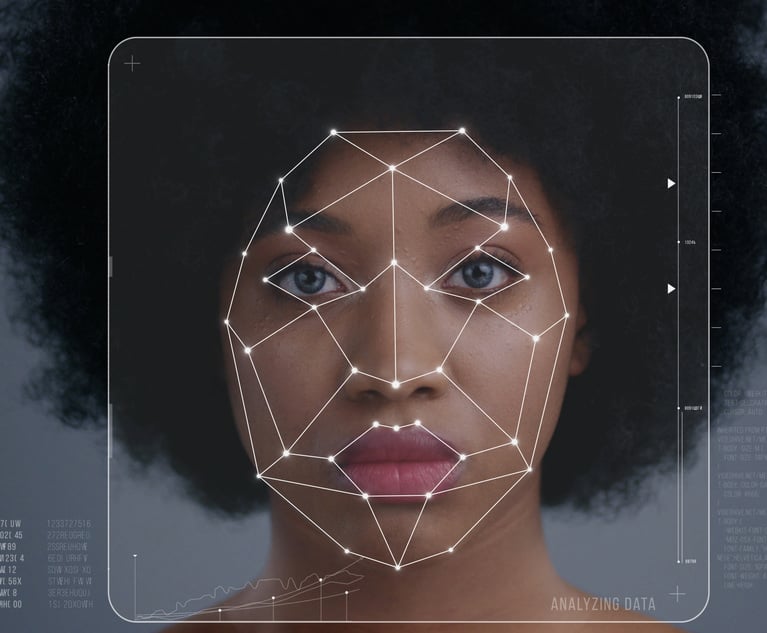 Credit: Rawf8/Adobe Stock
Credit: Rawf8/Adobe StockIn 2-1 Ruling, Court Clears Way for Decade-Old Wrongful Imprisonment Suit
The Third Circuit ruling is significant because "qualified immunity makes it extremely difficult for victims of police misconduct to achieve justice," said plaintiff counsel Tracey Hinson.
January 09, 2025 at 05:30 PM
5 minute read
What You Need to Know
- Third Circuit denies Newark Police Department's bid for qualified immunity in suit by a man wrongly imprisoned for six months.
- Issuance of an arrest warrant does not confer qualified immunity because of false statements and omissions by investigators.
- A dissenting judge said omissions of exculpatory information were immaterial.
The U.S. Court of Appeals for the Third Circuit has ruled 2-1 that a Newark, New Jersey, police detective is not entitled to qualified immunity in a civil rights suit by a man who was falsely accused of murder.
By affirming a district court judge's decision on whether Det. Joseph Hadley and the City of Newark are entitled to qualified immunity, the appeals court clears the way for Corey Fallen to proceed to trial in his 10-year-old civil rights suit.
Qualified immunity, a doctrine that protects police officers from civil suits related to their jobs, has been a polarizing issue between conservatives and liberals, and the split vote in the present case is an illustration of that.
Judge Thomas Hardiman, who was nominated by President George W. Bush, issued a ruling finding the appellants were not entitled to qualified immunity. His decision was joined by Judge Ariana Freeman, who was nominated by Joe Biden and is the first woman of color on the Third Circuit.
Judge Peter Phipps, who was nominated by Donald Trump, issued a dissent.
Extradited
The ruling stems from the 2012 murder of Denise Ramsey, whose body was found in a vacant lot in East Orange.
The New Jersey State Police was lead investigating agency and had assistance from the Newark Police Department.
Fallen, a restaurant cook in Atlanta, was charged with the murder even though he said he had never visited New Jersey before and that he was at work at the time of the murder. After he was extradited to New Jersey and charged with killing Ramsey, he remained in jail for six months until a grand jury declined to indict him. While he was behind bars, Fallen's wife gave birth to the couple's son.
Witnesses said when Ramsey was last seen alive she was in the company of two men. One of the men, who was described as a Black male, around six feet tall, with light skin, was bragging about his recent exoneration in a murder case in Atlanta, court documents allege.
When the New Jersey authorities consulted with police in Atlanta, they learned Fallen was just exonerated in a murder case. Fallen is a light-skinned Black man, but he only stands at five feet five inches.
Later, back in New Jersey, a witness who was shown a photo array lineup picked Fallen when asked to point to the man seen with Ramsey.

The case was later removed to U.S. District Court for the District of New Jersey. The defendants sought summary judgment. They claimed they had probable cause to arrest, detain and prosecute Fallen, because a judge, relying on McEnroe's affidavit, had issued an arrest warrant in Fallen's name.
But U.S. District Judge Evelyn Padin denied the motion for summary judgment, finding the arrest warrant was issued based on false statements and omissions of exculpatory evidence.
Hadley and Newark appealed the ruling.
Polarizing
Judge Hardiman wrote that because the investigators obtained an arrest warrant for Fallen, Hadley would be entitled to qualified immunity unless he knowingly and deliberately, or with a reckless disregard for the truth, made false statements or omissions when applying for the warrant.
But the investigators obtained the warrant even though they knew of exculpatory evidence, had reasons to believe his witnesses were unreliable and that another person had confessed to the murder.
"In sum, when the facts are viewed in the light most favorable to Fallen, Hadley would not be entitled to qualified immunity because an apparently valid warrant does not render an officer immune from suit if his reliance on it is unreasonable in light of the relevant circumstances," Hardiman wrote.
Phipps, in his dissenting opinion, said that even if the exculpatory information omitted from the arrest warrant affidavit had been included, there would still have been probable cause for the charge of conspiracy to commit murder, and so the omitted information was immaterial.
"With clearly established precedent from this court that an otherwise valid arrest warrant loses its legitimacy upon an officer’s later acquisition of material exculpatory information, Hadley merits qualified immunity," Phipps wrote.
'A Good Day for Victims'
Newark and Hadley were represented by Emilia Perez of the city's legal department. She did not respond to a request for comment about the ruling, and a city spokesperson also did not respond.
Tracey Hinson of Hinson Snipes in Princeton represented Fallen. She said the ruling would bring him closer to getting his day in court. When he had to return to New Jersey for a deposition in the case, he was reluctant to get on the plane because what happened here left him traumatized.
Hinson said the Third Circuit ruling is significant because "qualified immunity makes it extremely difficult for victims of police misconduct to achieve justice. It is a shield."
"It shields police officers from the consequences of their conduct," Hinson said. "So when there is a decision, or when the appeals court finds that the conduct is so egregious that there is no shield, that qualified immunity does not shield the officers conduct, that is a good day for victims of police misconduct."
NOT FOR REPRINT
© 2025 ALM Global, LLC, All Rights Reserved. Request academic re-use from www.copyright.com. All other uses, submit a request to [email protected]. For more information visit Asset & Logo Licensing.
You Might Like
View All
Union Leader Awarded $662K Judgment Against Employer in Decade-Old Wiretap Suit
5 minute read
Virtua Drug Tests Pregnancy Patients Without Consent, NJ Attorney General Alleges in New Suit
3 minute read
'Bewitched by the Technology': $300K to Settle Faulty Facial Recognition
4 minute readTrending Stories
Who Got The Work
Michael G. Bongiorno, Andrew Scott Dulberg and Elizabeth E. Driscoll from Wilmer Cutler Pickering Hale and Dorr have stepped in to represent Symbotic Inc., an A.I.-enabled technology platform that focuses on increasing supply chain efficiency, and other defendants in a pending shareholder derivative lawsuit. The case, filed Oct. 2 in Massachusetts District Court by the Brown Law Firm on behalf of Stephen Austen, accuses certain officers and directors of misleading investors in regard to Symbotic's potential for margin growth by failing to disclose that the company was not equipped to timely deploy its systems or manage expenses through project delays. The case, assigned to U.S. District Judge Nathaniel M. Gorton, is 1:24-cv-12522, Austen v. Cohen et al.
Who Got The Work
Edmund Polubinski and Marie Killmond of Davis Polk & Wardwell have entered appearances for data platform software development company MongoDB and other defendants in a pending shareholder derivative lawsuit. The action, filed Oct. 7 in New York Southern District Court by the Brown Law Firm, accuses the company's directors and/or officers of falsely expressing confidence in the company’s restructuring of its sales incentive plan and downplaying the severity of decreases in its upfront commitments. The case is 1:24-cv-07594, Roy v. Ittycheria et al.
Who Got The Work
Amy O. Bruchs and Kurt F. Ellison of Michael Best & Friedrich have entered appearances for Epic Systems Corp. in a pending employment discrimination lawsuit. The suit was filed Sept. 7 in Wisconsin Western District Court by Levine Eisberner LLC and Siri & Glimstad on behalf of a project manager who claims that he was wrongfully terminated after applying for a religious exemption to the defendant's COVID-19 vaccine mandate. The case, assigned to U.S. Magistrate Judge Anita Marie Boor, is 3:24-cv-00630, Secker, Nathan v. Epic Systems Corporation.
Who Got The Work
David X. Sullivan, Thomas J. Finn and Gregory A. Hall from McCarter & English have entered appearances for Sunrun Installation Services in a pending civil rights lawsuit. The complaint was filed Sept. 4 in Connecticut District Court by attorney Robert M. Berke on behalf of former employee George Edward Steins, who was arrested and charged with employing an unregistered home improvement salesperson. The complaint alleges that had Sunrun informed the Connecticut Department of Consumer Protection that the plaintiff's employment had ended in 2017 and that he no longer held Sunrun's home improvement contractor license, he would not have been hit with charges, which were dismissed in May 2024. The case, assigned to U.S. District Judge Jeffrey A. Meyer, is 3:24-cv-01423, Steins v. Sunrun, Inc. et al.
Who Got The Work
Greenberg Traurig shareholder Joshua L. Raskin has entered an appearance for boohoo.com UK Ltd. in a pending patent infringement lawsuit. The suit, filed Sept. 3 in Texas Eastern District Court by Rozier Hardt McDonough on behalf of Alto Dynamics, asserts five patents related to an online shopping platform. The case, assigned to U.S. District Judge Rodney Gilstrap, is 2:24-cv-00719, Alto Dynamics, LLC v. boohoo.com UK Limited.
Featured Firms
Law Offices of Gary Martin Hays & Associates, P.C.
(470) 294-1674
Law Offices of Mark E. Salomone
(857) 444-6468
Smith & Hassler
(713) 739-1250







